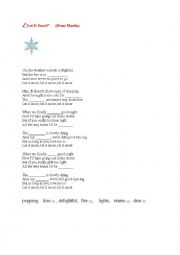
Besides, people who need people are the luckiest people in the world, and Styne never forgot which people composers need. Styne never wasted his time with false modesty - in the Seventies, he announced he was America's greatest living composer - but his ego was so lightly worn it was rather endearing. With a Styne tape, half the essential words came pre-removed, as an ever more emphatic composer galloped on to his next big point, skipping two out of every five words before concluding triumphantly (as he once did to me after a complicated effusion on arrangers): "So them becoming that didn't become that!" I had a radio producer who hated it whenever I brought him an interview with Jule Styne: Most radio editing involves removing extraneous words. His lyricists on "The Party's Over" and "Make Someone Happy", Betty Comden and Adolph Green, considered it a language all its own: Stynese. And, even when he wasn't yelling, his mind tumbled along faster than the words could keep up, so that his speech often omitted key verbs and nouns. He yelled at Sinatra, which would cause occasional half-decade ruptures in their relationship. He yelled at Jerome Robbins and Ethel Merman on Gypsy, he yelled at Streisand at Funny Girl.

I remember it shaking when he waved his arms around and yelled, to make some point or other. I noticed he wore a gold identity bracelet, and he showed me the inscription on the inside: "To Jule, who knew me when, Frankie" - a gift from Sinatra delivered to a bleary Styne by a courier from Cartier's the morning after the singer's spectacular solo debut at the Paramount Theatre in 1942. The first time I met Styne was at his office up the dingy stage-door stairs above the Mark Hellinger Theatre on Broadway. I knew Jule Styne somewhat, and Sammy Cahn rather better: He was very generous to me, and opened a lot of doors. Sometimes it pays to be counter-intuitive: The following winter, on the chilliest of days, Styne & Cahn wrote "The Things We Did Last Summer". But Jule said, 'Let's go write a winter song.'" That being so, he continued, "I wanted to go to the beach and cool off. Styne & Cahn were sitting in the offices of the Edwin Morris music publishing company on what Sammy told me was "one of the hottest days in the history of Los Angeles". It didn't seem that smart a move in July 1945. But even for songwriters that successful, a lasting seasonal hit is an insurance policy that never stops paying out the "Yuletide gravy", as Variety called it. Styne was a blockbuster Broadway composer of the post-war era - Gentlemen Prefer Blondes, Gypsy, Funny Girl - and Cahn wrote the lyrics that re-defined the post-bobby-sox Sinatra as a ring-a-ding-ding swinger: "The Tender Trap", "Come Fly with Me", "My Kind of Town". Making paper snowflakes out of your old birthday cards.The men who wrote it are no strangers to these parts: Jule Styne and Sammy Cahn. Just upbeat enough to motivate you to get some shopping done. The beat is driving, but not too driving.

It’s a small difference, but a big difference.ģ. In the original, the words “let it snow” are sung to a descending melody here, the line ascends. The combination of live and synthesized instruments helps bring the song from the past into the present.Ģ. So really, if you consider this song’s contradictions, it seems right that a 19-year-old producer from Austria has wrenched it from the hands of the Michael Bubles and Celine Dions of the world, freshened it up a little, and given us something different in our stockings this year.ġ. Secondly, despite all the wintry references, it wasn’t written during the winter. So if you ever imagined the songwriters huddling together by their stockings to write this tune, you can abandon that altogether: Sammy Cahn and Jule Styne wrote it in the summer. The only food mentioned is popcorn, which is hardly a yuletide treat. No references to Santa, reindeer, or chestnuts roasting on a fire, open or otherwise.

This is a dark, ethereal, driving version of a song more usually associated with words like bright, cheery, and fluffy.īut upon closer inspection, the original song hides a few surprises itself.įirst of all, even though we think of it as a Christmas song (and it’s been on Christmas albums by everyone from Dean Martin to Kylie Minogue) the word “Christmas” is nowhere to be found in the lyrics. If you’re surprised by what you hear when you press play this week, I don’t blame you.


 0 kommentar(er)
0 kommentar(er)
